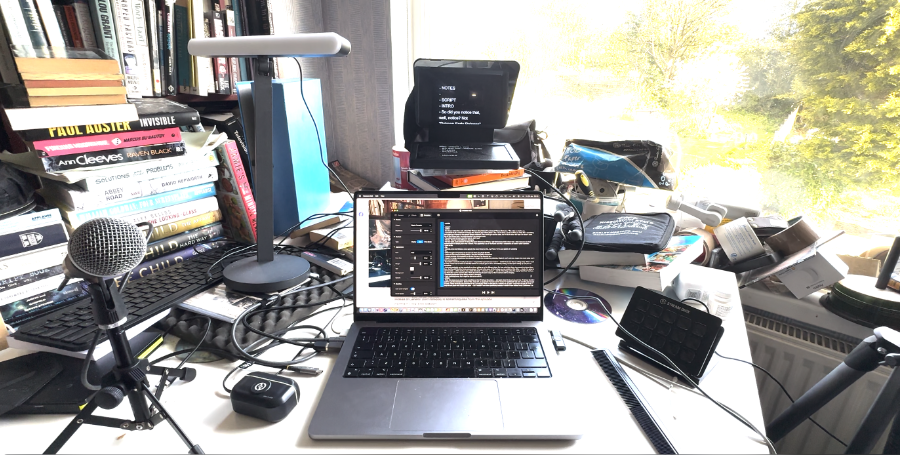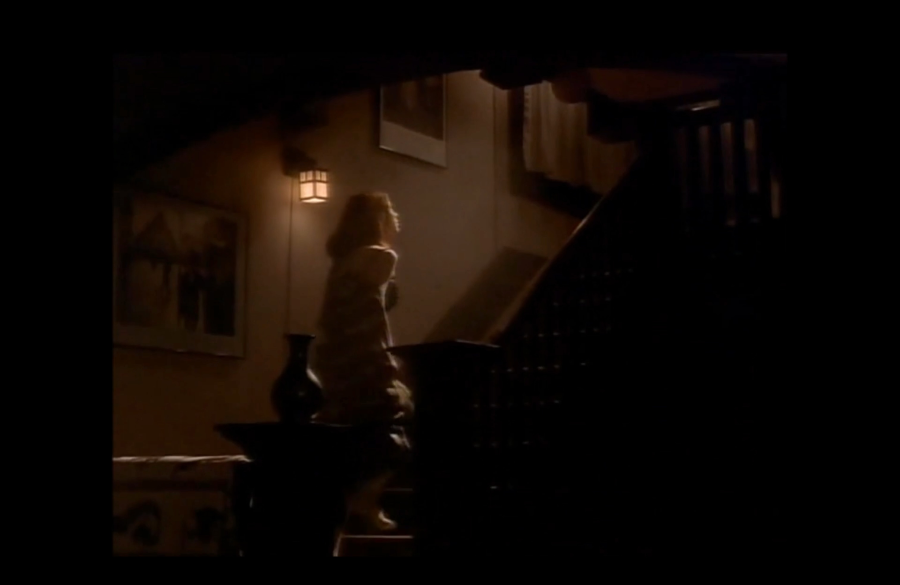There’s an unanswered debate in television news to do with just how long you keep captioning something as being Breaking News. I think the best approximate answer is that you do it until you can reasonably expect most of your audience to know whatever it is — but I also think that in practice, it’s usually left too long and often only ended because something else has happened which takes over the Breaking News label.
But now I’m wondering if the same thing is true in drama. Follow, using Torchwood as an example. I want to say first that I think Torchwood is quite deeply underrated and also that the writer of the episode I’ve just read the script is JC Wilsher, who I quite deeply admire. Nonetheless, the teaser to his episode “Reset” concludes with this:
This as the big door rolls open to reveal:
JACK: Miss Martha Jones!
Push in on Martha, standing, framed by the door, grinning.
You can read the script here. There’s no way to not realise that she’s important. But there is something in the writing and in the episode that leaves me thinking it is presumed you know who she is. To be clear, Martha Jones was in Doctor Who until June 30, 2007, and Torchwood: Reset aired February 13, 2008. Maybe I’m being unreasonable here since 2007 is now an impossible 17 years ago, but even on first airing, Martha had left our screens months before. About seven and a half months, to be exact.
So there’s just something wrong here, for me. Something wrong about the tone. There’s something off about the presumption of what the audience already knows. I think about this a lot: no show goes on the air without a lot of publicity so generally speaking an audience is at least very likely to know the premise, so there’s a question over whether the show should get on with things faster.
Alan Plater did a lovely thing with exactly this and the drama Belonging, based on the novel The Web of Belonging by Stevie Davies. Since the entire thing was about someone going missing, and that was entirely how it was publicised, Alan had this person missing right at the start — for just a moment. He played with our expectations and if he was having a little laugh at us, either we were in on the laugh or if we didn’t already know the premise, the gag still worked without spoiling anything. That’s a remarkably deft bit of writing, and I’m sure it came from this meta business of the story and what the audience is supposed to know.
If you look up this season of Torchwood – it was the second one – you find that the general consensus is that it was better than the first. I’m not sure. I like the show very much and there are superb episodes in that second season, but there’s also very often a tone I don’t think is right. Too often the characters will make little quips — not in Reset, just generally — and I say too often, what I mean is more than never. Every time there’s a smart aside, I’m out of Torchwood and into bad 1970s US police shows with perfect human beings saying what no one ever says and having squarer jaws than is feasible.
I’m also somehow excluded when it should feel inclusive. Typically the quip will be to do with how the main character, Captain Jack Harkness, literally cannot die, or it’s about his polyamorous nature, both of which are things that the audience does know, does get to know about. So these characters making these comments, they’re saying what we know, therefore it should feel as if we are in on the quip, we get it.
Instead, somehow, it’s excluding. It feels smug. Instead of my being in the story, I feel as if I’m watching a story. There’s a later episode, I won’t name it, where I had the oddest feeling throughout that the characters were saying what they were saying solely because that was what was written down in the script. It didn’t feel like characters talking. I don’t understand this because reading the script it seemed okay, it was only then watching the finished show that it felt wrong. And Torchwood had excellent actors, yet still lines and quips didn’t land.
I’m talking about this now because I’m reading the scripts but with this unnamed other episode, watching it now I remember so clearly being really irritated in 2008 by the production. One character has grabbed a certain thing and is now running to get to somewhere, and as a viewer I have not one thing clue why they particularly want to get to this place. Why they want to get away, fine, got that, but why this location other than it’s an excellent filming location, that’s beyond me.
Then there is a moment when the thing he grabbed has to be thrown to someone and that was an oh-for-god’s-sake (OFGS) instant. The thing is shown going through the air in slow motion and over it we have felt like — and I’ve read the script now, I know it’s true — a last-minute addition. It was a last minute addition that has a character explaining why this thrown thing is important.
It’s an extra line but one of those that you can smell the BBC meetings that went on about it. Viewers won’t understand, goes the logic, so we have to tell them.
Yeah, no, if the audience does not understand something in minute 40 of a 45-minute story, it’s the preceding minutes that need to be fixed, not the 40th by itself. Over and over, in so many films and TV shows you see exactly this worry, but even when it’s right, even when it’s true that the audience will not understand, let them not understand. They’ve stuck with you for 40 minutes, they’re in the story, don’t throw them out because you think you need an OFGS explanation.
I started there being specific about Torchwood and then I got a bit more general. I’d like to go back to Torchwood to tell you a nicer story about it.
I can’t remember the date now, but it would have been sometime after July 2009 when Torchwood: Children of Earth ran as a five-night special. I was in Cardiff at Upper Boat, what was then the Doctor Who studios, for a Radio Times Torchwood photoshoot. Actors Eve Myles and John Barrowman were there in costume, there was an armorer who showed me the shockingly heavy guns the characters were to be filmed at and I wish to god I could remember why we were all doing it.
But at the end, walking out with Eve Myles, I told her about my watching Children of Earth. The episodes ran right before the nightly news on BBC1 and I told her that on the first evening, watching the news, I couldn’t comprehend why what was happening to the children wasn’t being mentioned. I had got so into the story that I genuinely couldn’t grasp why what was happening to them wasn’t breaking news.
Seriously.
And get this: all these years later, I read the five scripts to Torchwood: Children of Earth and felt exactly as overwhelmingly caught up in it. Right there on the page, agog without any actors, any production, just the text, and over something I’d already seen. It was a marvellous, marvellous read.
I want to say that I love this, I love that a drama can so envelop your mind, but actually I don’t think the word love is remotely close enough. I lust after drama that does this to you, even for a moment. And while I trundle along thinking I want to write drama like that, I also think that it’s something Torchwood was able to do far more often than it is given credit for.

